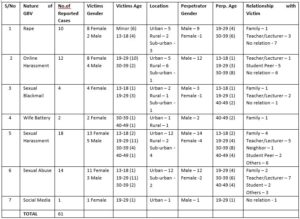PRESS CONFERENCE ON THE NEED TO ADDRESS GENDER-BASED VIOLENCE IN KANO STATE BY THE CENTRE FOR INFORMATION TECHNOLOGY AND DEVELOPMENT (CITAD) ON THE 12TH OF OCTOBER, 2021
PRESS CONFERENCE ON THE NEED TO ADDRESS GENDER-BASED VIOLENCE IN KANO STATE BY THE CENTRE FOR INFORMATION TECHNOLOGY AND DEVELOPMENT (CITAD) ON THE 12TH OF OCTOBER, 2021
Gender-Based violence is a harmful act being inflicted at individuals based on their gender. This has to do with gender inequality, the abuse of power and harmful norms. GBV is a serious violation of human rights and a life-threatening health and protection issue. Estimates published by WHO indicate that globally one in three women has experienced sexual or physical violence in her life. “Violence against women Prevalence Estimates, 2018â€
From the cultural perspective, the practice of gender-based violence is predominant in the world societies, especially developing countries like Nigeria. One of the identifiable forms of GBV is sexual harassment or abuse of children by either their parents or guardians.
These abuses have endangered the lives of many girls in the society and often times led to physical and psychological harms, even death sometimes: GBV therefore remains an obstacle to girls’ education and children development in general.
As part of the effort to curb GBV in the society and to promote the wellbeing of women and girl child, including creating a safe and secure educational environment, the Centre for Information Technology and Development (CITAD) with support from Ford Foundation has been implementing a project titled “Strengthening Citizens Response and Protection Against Gender Based Violence in Kano, Nigeria†whose aim is to Achieve a safe society for women and girls, free from gender violence and discrimination to bridge gender gap in girl child education, allowing for the attainment of gender parity in educational accomplishments  .
This involves stakeholders’ engagement, advocacy, tracking and monitoring of GBV incidences in order to make informed statements. It is for this reason that the organization has instituted a monthly press conference to share information and data relating to GBV in Kano State. The objective of doing this is to create public visibility of this menace and sensitize all stakeholders to take action for addressing it.
Our Efforts:
In tracking incidences of GBV in the state, CITAD has deployed a multi-approach mechanism including:
- The use of electronic platforms for people to reports incidences in privacy
- The use of monitors in tertiary institutions in the state
- Embedded monitors within communities
- Cooperation and sharing of data with various agencies such as National Orientation Agency (NOA)
- Sensitization activities by trained champions with the communities
The table below shows the breakdown analysis of data collected on the GBV App in the month of September 2021.
Download the table using the link below
The data above shows that GBV is been perpetrated against both male and female gender with a higher number of female victims within all age ranges in both rural, urban and suburban communities with prevalence in Urban communities. The perpetrators are also of both genders, although with a higher number of male perpetrators. It was also observed that the perpetrators are either family members, teachers/lecturers, student peers or even those that have no relation to the victims.
Recommendations:
– Kano State House of Assembly to domesticate the Child Rights Act and VAPP Act at the state level which will contribute in reducing this menace.
– Kano state government to speed up the implementation of Child Right Act in the State as this will help in reducing child abuse in the state
– Religious leaders to use their preaching platforms in creating awareness against GBV in the state
– Traditional leaders both at state and local levels to work with different authorities in curtailing the menace of GBV in the state
– Institutions of higher learning in the state should all develop and implement gender policy and create appropriate mechanisms for victims and others to reports such incidences to the authorities.
– The state government to not only adopt laws to protect women and girls, but also establish referral centres and forensic centres for victims.
– Government and Non-Governmental organizations should intensify activities to promote awareness and advocacy on violence against women.
– Media houses to use their platforms in creating awareness against GBV and be reporting punishments done to perpetrators of GBV instead of GBV cases.
Zainab Aminu
Gender Project Programme Officer

